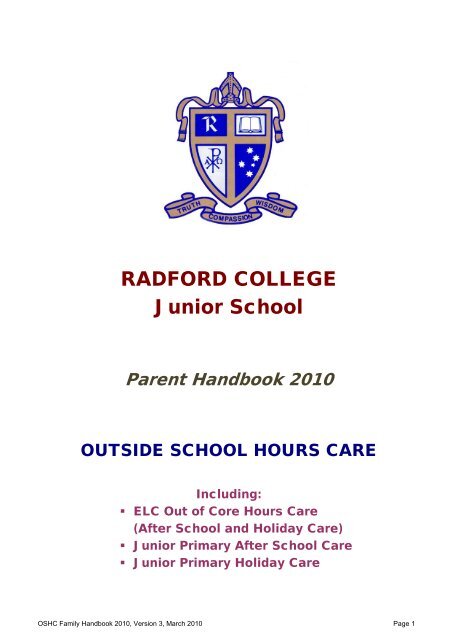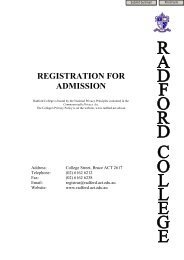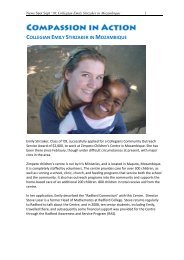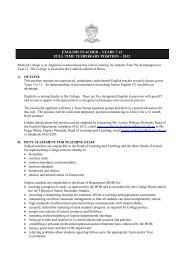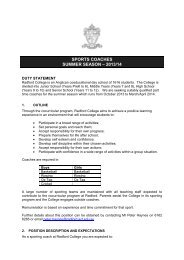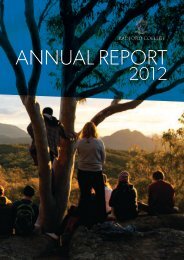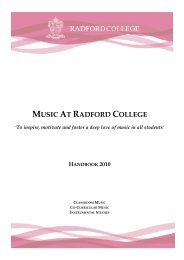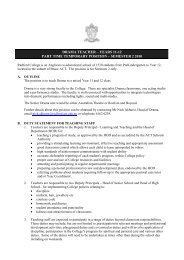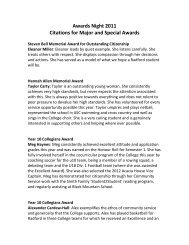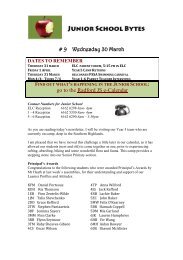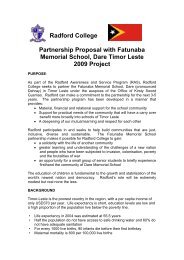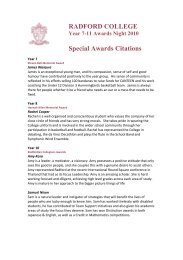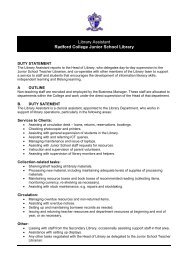Radford College Junior School
Radford College Junior School
Radford College Junior School
You also want an ePaper? Increase the reach of your titles
YUMPU automatically turns print PDFs into web optimized ePapers that Google loves.
RADFORD COLLEGE<strong>Junior</strong> <strong>School</strong>Parent Handbook 2010OUTSIDE SCHOOL HOURS CAREIncluding:• ELC Out of Core Hours Care(After <strong>School</strong> and Holiday Care)• <strong>Junior</strong> Primary After <strong>School</strong> Care• <strong>Junior</strong> Primary Holiday CareOSHC Family Handbook 2010, Version 3, March 2010 Page 1
WelcomeThe <strong>Radford</strong> <strong>College</strong> Outside <strong>School</strong> Hours Care (OSHC) staff extend a warm welcome to yourchild and family. We encourage all families to read through this handbook, as it will familiarise youwith the important policies and procedures of our program.Staff<strong>Radford</strong> <strong>College</strong>PrincipalMr Phillip HeathBA (Hons), MA (Hons), Dip Ed, FACE, MACEAEmail: principal@radford.act.edu.auAssistant Principal (Head of <strong>Junior</strong> <strong>School</strong>)Mr Paul SouthwellDip Teach (Primary), BEd G&TGrad Dip Ed AdministrationEmail: paul.southwell@radford.act.edu.auDirector of Learning and Teaching (P-2)Ms Tanya StevensonEarly Learning Centre Co-ordinatorMs Sarah BoardmanBA, DipEd, Cert CEFL, MEdStEmail: tanya.stevenson@radford.act.edu.auPhone: 6162 6257BEd (Early Childhood), Cert Teach.Email: sarah.boardman@radford.act.edu.auTelephone: 6162 6298Outside <strong>School</strong> Hours Care<strong>Radford</strong> <strong>College</strong> Outside <strong>School</strong> Hours Care (OSHC) is a program run by the <strong>College</strong> under theguidance of the Business Manager and Finance Manager. The service is not for profit, with feesgoing directly into the running of programs and the development of activities and resources.All permanent and casual staff working at the OSHC programs are employed by the <strong>College</strong>, underthe Director, and are required to undergo reference checks and an Australian Federal Police –National Police Check. OSHC staff are supported by the Director and are encouraged to attendrelevant internal and external training.DirectorMrs Alena VoyseyCoordinator (<strong>Junior</strong> <strong>School</strong>)Karen DuhiggCoordinators (ELC)Miss Leah McInerneyMrs Sandra KalasBEd (Primary)Email: afters@radford.act.edu.auPhone: 6162 5308Dip Children’s ServicesCurrently enrolled BEd (Primary)Email: afters@radford.act.edu.auPhone: 0408 117 430 (between 2 and 6pm)Dip Children’s ServicesCurrently enrolled BEd (Primary)Dip Children’s ServicesCurrently enrolled Cert IV (Training and Assessment)Email: afters@radford.act.edu.auPhone: 0448 928 801 (between 2 and 6pm)OSHC Family Handbook 2010, Version 3, March 2010 Page 2
Our programsPhilosophy<strong>Radford</strong> <strong>College</strong> OSHC will provide a care and education environment that enables children toparticipate in play, recreational and relaxation experiences, interact positively with peers and adults,develop life-skills, and complete homework or other tasks (<strong>Junior</strong> <strong>School</strong> only).We embrace the child and the periods of early and middle childhood as unique, special and animportant stage of life. We believe that children have an amazing capacity to be active participants intheir own learning journeys and so we will endeavour to provide an environment that stimulates wonderand curiosity, respect and independence.We believe that:• children learn through play and exploration of their environment whilst engaging in positiverelationships with peers and adults;• each individual is unique and thus it is important to value difference in regard to race, gender,culture, religion and ability;• children learn about the world in different ways and at different rates;• families are the child’s first educator and caregiver, and as such we value their partnership inbuilding a shared understanding of their child’s strengths, interests and needs.Objectives• Provide a warm, caring and inclusive environment in which all children feel they are special, andhave a place in the program;• Assist each child to make a smooth transition from the classroom to the OSHC program throughthe establishment of a consistent daily routine;• Provide experiences which support children’s social, emotional, cognitive, physical, emotionaland creative development;• Develop and maintain each child’s self-esteem by building strong feelings of self worth andpersonal potential;• Encourage children to develop independence, cooperation and personal responsibility;• Promote appropriate means for relaxing, expressing emotions and managing our environment;• Recognise that children are individuals and have different abilities, interests and needs;• Respect and value the diversity of children, families and staff;• Provide a safe and healthy environment and promote healthy behaviours including goodhygiene and nutrition;• Recognise the professional status of staff and encourage professional development; and• Maintain an effective partnership with other sections of <strong>Radford</strong> <strong>College</strong> and create links withthe wider community.About our ServiceOur OSHC program acknowledges the efforts and hard work the children have exerted during the day.We also recognise the unique opportunity for social interaction with children of various ages, and caringadults. Thus, our program seeks to provide a balance of relaxation, recreation and play experiences tocater for a range of interests and abilities.During the afternoon the children will be given opportunities to enjoy:• a healthy and appetising afternoon tea, and be encouraged to participate in its preparation andclean up;• outdoor play and learning experiences;• whole group and small group meetings and conversations;• art and craft, music, drama, science and nature experiences;• indoor play and learning experiences; and• time and resources to complete homework requirements (<strong>Junior</strong> <strong>School</strong> only).Excursions involving the use of transport will be offered during Holiday Care programs only.OSHC Family Handbook 2010, Version 3, March 2010 Page 3
Our <strong>Junior</strong> <strong>School</strong> programs have an Approval in Principle from the Office for Children, Youth andFamily Support (OCYFS) to run an approved children’s service.Our ELC programs are operated under <strong>Radford</strong> <strong>College</strong> Early Learning Centre’s IndependentPreschool Licence. During Out of Core Hours programs, we are required to operate in accordance withCentre Based Care Conditions.The OCYFS monitors our compliance with Licence Conditions. Our Children’s Services Adviser isVanessa Smith who can be contacted at the Office for Children, Youth and Family Support on 62071104.Our <strong>Junior</strong> <strong>School</strong> After <strong>School</strong> Care is registered for the Quality Assurance process with the NationalChildcare Accreditation Council (NCAC) and all programs participate in Continuous Improvementpractices.Benefits of PlayThe most beautiful experience in the world is the experience of the mysterious.Albert EinsteinThe OSHC environment is a wonderful setting for children to interact with each other and theirenvironment in a relaxed atmosphere. Through play experiences:• new thinking and understanding are gained through the exploration of materials and ideas;• problem solving is developed through trial and error, negotiation and seeing others’ points ofview;• resilience is developed through using initiative, taking risks and making mistakes;• social competence is fostered through collaboration and learning ways to work effectively withand alongside others;• new skills can be mastered through practice; and• resourcefulness is developed.OSHC Family Handbook 2010, Version 3, March 2010 Page 4
DocumentationProgramWeekly programs and term afternoon tea menus are displayed on the information boards at each of ourprograms. The programs are developed by the Coordinator in collaboration with staff and children. Weaim to support children to initiate and pursue their own play experiences, investigations and interests.Therefore our program is very flexible and responsive to the children’s needs. Staff will be involved inevaluating the activities, experiences, resources and care we provide in order to contribute tocontinuous improvement.Visual diaryThe staff will regularly display a visual diary of experiences we have been involved in during ourprograms. Staff, children and their families are welcome to contribute a comment to the evaluation ofeach experience.ProfilesThe OSHC staff will gather information through questionnaires, observations, photographs and reportsto gain an understanding of children’s strengths, interests and needs. This information will then be usedto program activities and experiences to better meet the needs of children attending our programs.FeedbackYour feedback on our program ensures our continuous improvement as we endeavour to meet theneeds of the children and their families. You are invited to contribute your ideas, suggestions andissues through our Suggestion Box located at each After <strong>School</strong> Care Program or via email to theDirector (afters@radford.act.edu.au).As part of our monthly newsletter we will request your feedback on our policies and procedures as wellas our Parent Handbook. This feedback may be done anonymously if you wish.PoliciesSome policies are included within this handbook. Our Policy Manual contains the OSHC policies and isavailable at both programs for your inspection. Please ask your program’s Coordinator to view ourpolicies.OSHC Family Handbook 2010, Version 3, March 2010 Page 5
Policies and ProceduresOperating Details:Hours• After <strong>School</strong> Care operates in the <strong>Junior</strong> <strong>School</strong> between 3:20pm and 6:00pm.• Out of Core Hours Care operates in the ELC between 3:00pm and 6:00pm.• Holiday Care operates during selected holiday periods only between 8:10am and 6:00pm.Venue• The <strong>Junior</strong> <strong>School</strong> program will be based in the Blue Room. Activities may also take place in thelibrary, playground, oval, canteen or hall. Please report to the staff at the Blue Room beforecollecting your child from other areas.• The ELC program will operate in the Piazza. Children may visit the oval or other areas of the<strong>Junior</strong> <strong>School</strong> and in these instances the coordinator will leave a note indicating their locationand expected return time.Administrative Procedures:Fees: After <strong>School</strong> CareAs of January 2010 the fees per child, per session are:Permanent Booking*: $20.00 Casual Booking^: $23.00Invoices are emailed fortnightly in advance and payments can be made through the <strong>Radford</strong> <strong>College</strong>Accounts office by credit card or through the program coordinators by cash or cheque. Direct debit canalso be arranged. Details can be found on your statement or by contacting the Director.Fees: Holiday CareAs of January 2010 the cost for Holiday Care is $52.00 per child, per day. This includes all activitiesand excursions, but not meals.Payment in full in advance is required to secure your booking. This is non-refundable.Child Care Benefit (CCB) and Childcare Tax RebateAs of January 2010 CCB and the Childcare Tax Rebate is available to eligible families using our <strong>Junior</strong>Primary After <strong>School</strong> Care program and our <strong>Junior</strong> Primary Holiday Care Program. Families mustprovide the Director with their family Customer Reference Number (CRN) and the CRN’s for allchildren attending any registered care. By providing this information the Family Assistance Office isable to calculate entitlements. Families will not receive the above benefits when this information is notprovided.Please note these benefits are not currently available for programs running out of the ELC.For more information about CRN’s for your family or children, please contact:Family Assistance Office13 61 5013 12 02 for information in languages other than Englishhttp://www.familyassist.gov.auPenaltiesCollection of children after 6pm will incur a penalty fee, to cover extra wages for staff.6:01pm – 6:30pm:6:31pm onwards:$1.00 per child per minute$2.00 per child per minuteA late payment fee may also be charged at the discretion of our Accounts office if your accountpayment is overdue.Please note CCB is not available on penalties.OSHC Family Handbook 2010, Version 3, March 2010 Page 6
Enrolment and BookingsAn enrolment form for each child must be completed annually, and signed each term to confirm thatdetails are current. Please ensure that you notify the Director of any changes to your contact details.Permanent bookings*A permanent booking is when After <strong>School</strong> Care is required on the same day/s each week – or fortnightfor shared care parenting arrangements. Please select the days that care is required on the enrolmentform. At least two weeks written notice of an absence or change in booking arrangements isrequired to avoid charge.Casual bookings^A casual booking is when After <strong>School</strong> Care is required occasionally during the term or in addition topermanent bookings. Casual bookings will be accepted by the Director taking into account theavailability of licensed places and staff. For casual bookings made on the day of care, children can benotified via their class teacher that they are to attend ASC.Holiday CareFamilies will be notified of upcoming Holiday Care programs through the OSHC noticeboards andOSCH newsletter as well as the <strong>Junior</strong> <strong>School</strong> newsletter. There will be an advertised closing date forbookings to allow preparation time for staffing and activity bookings. Bookings made after this time willbe accepted by the Director taking into account the availability of licensed places and staff.Priority of AccessThe Australian Government has set out the following three levels of priority which child care servicesmust follow when filling vacant places:• Priority 1: A child at risk of serious abuse or neglect• Priority 2: A child of a single parent who satisfies, or of both parents who satisfy, thework/training/study test under section 14 of the A New Tax System (Family Assistance) Act1999• Priority 3: Any other child.Within these main categories, priority should also be given to the following children:‣ children in Aboriginal and Torres Strait Islander families;‣ children in families which include a disabled person;‣ children in families on low incomes;‣ children in families from culturally and linguistically diverse backgrounds;‣ children in socially isolated families; and‣ children of single parents.When a service has no vacant places and is providing care for a child who is a Priority 3 under theGuidelines, the service may require that child to leave the child care service in order for the service toprovide a place for a higher priority child. The service must give 14 days’ notice to any family requiredto vacate their place.For more information on Priority of Access Guidelines, call FaHCSIA on 1300 653 227.Waiting Lists<strong>Radford</strong> <strong>College</strong> OSHC will endeavour to provide a place for all children requiring care. Waiting lists willbe created if all permanent and casual places have been filled. Families will be notified when a placebecomes available.AbsencesWhen your child is absent from school please advise the Director on 6162 5308 or via email:afters@radford.act.edu.au. This makes it easier for staff to account for all children. Two weeks writtennotice of an absence is required for a permanent booking to avoid charge in both After <strong>School</strong> Careprograms. Casual absences will be charged at the discretion of the Director.Holiday Care absences are non-refundable.OSHC Family Handbook 2010, Version 3, March 2010 Page 7
CancellationsShould you wish to cancel your child’s permanent booking from either After <strong>School</strong> Care program, twoweeks written notice must be given to the Director, otherwise fees will continue to be charged. This canbe done via email or a change of booking form available from your child’s Program Coordinator.Should you wish to cancel your child’s casual booking from either After <strong>School</strong> Care program, 24 hoursnotice is requested. This may allow us to accept another casual booking in its place. The session feemay be charged at the digression of the Director – depending on notice period.Arrivals and DeparturesArrivals• Year 1-4 children should make their way to After <strong>School</strong> Care as soon as school is finished.• Year 5-6 children make their way to the Blue Room using pathways and crossings.• All children are required to make themselves known to the designated staff member near theplayground or Blue Room, where they will be signed in and provided with sunscreen. Pleasenotify the Director if your child may need to be collected from their classroom.• Children in years 1-6 attending co curricular activities should make themselves known to staffupon their arrival. They will then be offered afternoon tea and informed of the afternoonsactivities.• ELC children are collected from their classrooms by a staff member.Any child not present by 3:45pm, and not known to be attending a co curricular activity, will besearched for within the <strong>Radford</strong> <strong>College</strong> grounds. If their whereabouts cannot be established by theProgram Coordinator or Director, their parent or guardian will be contacted by telephone.DeparturesPlease make yourself known to a staff member before collecting your child. If your child is usingequipment when you arrive, please encourage them to pack away. A staff member can assist ifneeded.Your child must be signed out on the roll, noting the time beside your signature. Children mustbe accompanied by an adult when leaving the programs. Staff will not allow children to signthemselves out nor sign out children on behalf of parents.We will not allow your child to be collected by anyone other than a parent/guardian, or authorised otheradult, whose details are provided on your child’s enrolment form. If staff do not know the personcollecting your child, they may ask for photo identification before releasing your child. When a newperson is collecting your child please inform the Director of their full name and relationship to the child.This allows us to ensure only persons known to parents or guardians are collecting children.Should a staff member have serious doubts as to whether a person collecting a child is fit to have thatchild released into their care because the person appears to be adversely affected by alcohol or drugs,the staff member will:• contact the Director;• raise the issue with the person concerned;• suggest alternatives or offer to call a friend or taxi;• contact the police if:o they become violent oro they leave with the child, giving registration details and direction of travel;• decide if it’s necessary to notify the relevant government authorities and do so within 24 hours.Late DeparturesPlease arrive to collect your child by 5:50pm. This will ensure that your child is able to pack awayequipment and collect their belongings in time to vacate the premises by our closing time of 6:00pm. Italso gives staff and families a few minutes to speak about any urgent matters.There will be a penalty fee applied for collection of children after 6:00pm. Our staff finish their shift at6:00pm and should reasonably expect to leave at this time to attend to their own family and othercommitments. If you are unavoidably held up and anticipate arriving after 6:00pm, please phone theservice mobile to notify staff. We appreciate your consideration.OSHC Family Handbook 2010, Version 3, March 2010 Page 8
If a child is not collected by 6:00pm we will endeavour to contact their parent/guardian, and thenemergency contacts by telephone. If a child still remains at the service at 6:30pm and staff are unablemake contact with a parent/guardian, we will notify Care and Protection services on 1300 556 729.Whilst children are in attendance of an Outside <strong>School</strong> Hours Care program they will be involved inprogrammed activities. Occasionally this means they may not be found on the programs premises for aperiod of time. In these instances parents will be informed of dates and times before thecommencement of that session of the program, or where that is not possible, the Coordinator of theprogram will leave a notice detailing where the children are and when they are due to return as well asa contact number. Such notices will be left on the parent sign in table and the door of the premises.Safety and Wellbeing:Sun Protection<strong>Radford</strong> <strong>College</strong> <strong>Junior</strong> <strong>School</strong> is accredited as a SunSmart school. All children and staff at OSHC arerequired to wear a hat and SunSmart clothing whilst outdoors, between the months of August - May.Children without a hat will be required to stay in shaded areas, or indoors when the choice is available.Staff will provide sunscreen or children may supply their own. For further information, please refer toour Sun Protection Policy.No smokingSmoking is prohibited at all schools and childcare premises, including outdoor areas.Accident PreventionThe following health and safety procedures have been put in place to help minimise the risk ofaccidents to staff, children and others who visit and use the ASC program:• We acknowledge the role parents/carers have in assisting us to ensure that the environmentremains safe and ask that they do not introduce items which may be potentially hazardous egknives in lunchboxes, toys with small parts;• OSHC staff will carry out a daily safety check on all areas to be used;• Equipment and facilities are checked periodically by the Facilities Manager;• Dangerous or sharp implements and chemical products will be kept in lockable storage;• Children may only enter the kitchen when supervised by an adult;• When gardening and handling soil and potting mix, children will be encouraged to wear gloves;• Emergency contact numbers, such as 000 and the Poison Information Line, will be stored onservice mobile phones;• Medications to be administered at OSHC are to be handed to staff and an authorisation formcompleted;• Parents are asked to adhere to the speed limits on <strong>College</strong> property and in the car park, and tobe particularly vigilant when reversing out of the car parks;• Parents are to supervise their children, including siblings, when exiting the OSHC program;• Glass jars, bottles and crockery may be used under adult supervision and all children will betaught how to manage and handle such things including how to deal with a broken item.Emergency proceduresEmergency procedures will be practiced quarterly as required by our Licence Conditions. The childrenare made aware of the Fire Evacuation and Lock Down procedures and are familiar with the noise ofthe alarm. The evacuation route is displayed on the wall in the Piazza and Blue Room. If we arerequired to evacuate the building, your child will be taken to the JA Mackinnon Oval.Mandatory ReportingAs part of the <strong>College</strong>’s determination to protect the security and safety of all children at all times and inthe affirmation and dignity of every child, active measures are put into place to prevent the occurrenceof child abuse or neglect. Where abuse or neglect has occurred or is suspected to have occurred thestaff are legally obliged to notify Care and Protection services.OSHC Family Handbook 2010, Version 3, March 2010 Page 9
Health and Hygiene:Hand washingThis is an essential part of hygiene procedures in children’s services as it is the most important way tostop the spread of infection. The correct procedure for effective hand washing will be displayed at handwashing sinks at OSHC venues. All staff will wash their hands:• At the commencement of their shift;• Before food preparation;• Before eating;• Before and after giving First Aid treatment;• After toileting or using a tissue;• After handling rubbish; and• After gardening or messy activities.All children will be required to wash their hands after toileting and before eating.IllnessIf a child becomes ill while at OSHC, the parent/guardian will be contacted; if he/she is not able to becontacted the emergency contacts will be called. Every effort will be made to ensure the children’scomfort until they can be collected.Please note that a child who becomes sick while at school will be sent home, rather than to ASC.Children and staff with an infectious condition will be excluded from the program as per the StayingHealthy in Child Care and ACT Health guidelines. A poster detailing the minimum recommendedexclusion periods is displayed at OSHC. Please notify staff immediately if your child has been exposedto any communicable disease, so that we can notify other families and staff.Action PlanAn Action Plan or Health Management Plan must be completed for any child who suffers from amedical condition such as severe allergy, asthma or epilepsy. This plan must be updated every year toensure it is current. Details of routine, extra medication and action to be taken in the event of symptomsmust be specified in the plan, and the parent/guardian and family doctor must sign it. Parental consentmust cover administration of extra medication if required.Food and Nutrition:An allergy-aware schoolWe ask that no food items containing nuts be brought into the school. As part of our responsibilities tothe protection and care of children, we will ensure that all staff and families are notified and educatedabout the dangers that nut products may inflict on those who suffer from these allergies. Please notethat this includes all types of nuts, not only peanuts. No nut products will be served for afternoon tea.NutritionMany eating habits are formed during childhood, and persist throughout life. We recognise ourresponsibility to each child’s development whilst in care to ensure that they are eating healthy andnutritious food. The most important factor is to ensure that children are exposed to a variety of foodsand that a balance of all types of food is provided. Thus our afternoon teas will reflect this balance.OSHC Family Handbook 2010, Version 3, March 2010 Page 10
Afternoon TeaAfternoon tea will be a shared meal for the children at ASC. The ASC staff will provide a variety of fruitand vegetables for afternoon tea, and water will always be available from the drinking fountains. A termmenu will be displayed on the notice board at each program. These menus are developed to reflect thetime of year as well as children’s preferences. Some possible menu options are:• Pasta• Home made pizza• Rice or corn thins with a variety of toppings• Fruit crumble with custard• Rice crackers, cheese, dried fruit• Breakfast cereal such as rice bubbles• Whole grain sandwiches with a variety of fillings• Fruit smoothiesOccasionally children will be served treats such as homemade cookies and children will be educatedabout “often” and “sometimes” foods.As part of our program small groups of children may be offered to assist with the preparation of food.They will always be working under the supervision of a staff member.Behaviour Guidelines:A child who is fully engaged usually demonstrates positive behaviour. Therefore the OSHC staff willmake every effort to be sensitive to the interests and needs of individual children in order to minimiseany inappropriate behaviours.Staff will endeavour to anticipate problems that may occur and re-direct children into a positive playenvironment. Children will be encouraged to solve minor problems themselves by discussing with astaff member appropriate words or actions that could assist in resolving conflict. These skills willempower the child and assist him/her with learning how to negotiate and cooperate.Prevention techniques used by staff include:• Establish trust and respect with all children;• Treat all children fairly;• Ensure that the environment is set up to minimise inappropriate behaviour eg appropriatevariety and amount of equipment, all areas supervised;• Involve children in establishing play and safety limits, in accordance with best practiceguidelines, and determining appropriate consequences when limits are not respected;• Model appropriate behaviour and language;• Give children adequate warning before the transition to another activity;• Show sensitivity to children’s needs by planning a pattern of quiet and active activities andmonitoring for excitement and tiredness;• Teach children to respect the rights of others and providing them with the language to empowerthem in a difficult situation;• Provide opportunities for children to seek information on appropriate ways to deal with theiremotions;• Take into account the children’s age, abilities, developmental needs, background and possiblereasons for behaviour; and• Spend time with groups of children, talking about possible ways to behave in different situations.OSHC Family Handbook 2010, Version 3, March 2010 Page 11
Inappropriate behaviourMaking mistakes is part of the learning process so whilst inappropriate behaviour will be dealt withaccordingly, we accept that it is often part of the natural development of the child.Behaviours such as swearing, ignoring staff instructions, anti-social behaviours, and misusingequipment are considered inappropriate.Any consequences given for inappropriate behaviour will be appropriate to the situation and to theindividual child, eg helping to clean up a mess.A child will only be separated from the group when other techniques such as distraction and praise forappropriate behaviour have not succeeded. Separation will be used as a short time to “cool off” and willonly occur after a clear warning has been issued and the child given a chance to remedy theirbehaviour. The child will be asked to sit away from the activity in full view of the staff.At no time will staff use physical punishment, isolation, humiliation or negative labelling as behaviourguidance strategies.Families will be notified of serious behaviour issues. The aim of such discussion will be to assist boththe family and staff to implement strategies that will help the child.The staff may seek the advice and support of an outside agency, such as the Behaviour Support Unit.The parents’ permission will be requested before support is requested for an individual child.Behaviours such as physical violence towards other children or staff will not be tolerated. If suchbehaviours occur, the child’s parents will be contacted and asked to collect their child immediately. Ifthis occurs, it will be followed up by a conference where the conditions for the child’s return to care willbe discussed and agreed upon.Children with Additional Needs:In order to ensure that children with additional needs are fully included in the OSHC program, familiesare requested to provide the staff with as much information as possible about the child’s needs andabilities upon enrolment. Our aim is to ensure that all children feel secure, happy and valued in theprogram, and that staff are familiar with the needs of each child and can accommodate these at OSHC.Where staff determine there is a need, the Director may request a meeting with other professionalpersonnel to discuss how the child can be fully included in all aspects of the OSHC program. Followingconsultation with families, teachers, ACT Inclusion Support Agency and other professionals, a decisionwill be made regarding the level of support that can be offered to the child. In some cases (determinedby Inclusion Support Agency) there is additional funding available to support participation and inclusion.Communication:Family Involvement PolicyMeaningful communication between staff, families and children is an essential component of thesuccessful day-to-day operation of OSHC programs. Both informal discussions and formal meetingsare a part of the network of communication and these are supported by written information which maybe given to parents or accessible on the <strong>Radford</strong> <strong>College</strong> website.Families are encouraged to contribute to OSHC as much as they wish or are able. Some of the waysfamilies may be involved in OSHC are: giving staff extra information to help us better care for yourchild, suggesting a menu item or activity, and visiting the service to share a special skill or tell us aboutyour occupation. However, we recognise that families are busy and have many other commitments.While families are more than welcome to become involved, there is no pressure or obligation to do so.OSHC Family Handbook 2010, Version 3, March 2010 Page 12
Communication with FamiliesA <strong>Junior</strong> <strong>School</strong> newsletter will be written once a fortnight. OSHC staff will contribute to this newsletterany relevant or important information. An OSHC e-newsletter will be emailed to parents once a monthand will be available in printed form at all programs.An OSHC notice board is located in the Piazza and Blue Room. This will be used to share informationabout staff, the weekly program and menu, special occasions, policies and other issues.Staff are always happy to have short, informal discussions about our program or your child’s care whenyou collect your child. As our duty of care is to the children while on program, please make anappointment with the Director for any lengthy discussions.Grievances and Complaints ProceduresAny minor concerns about our OSHC program can be brought to the attention of the Coordinator atyour program. Any serious complaint should be directed in writing to the Director of OSHC, who willacknowledge your complaint and inform you of the steps to be taken to investigate and resolve yourcomplaint. This may involve a meeting to ensure your concerns are heard fairly, and we may seekinformation from other parties to ascertain the facts pertaining to your complaint.Children with a grievance are encouraged to speak with a staff member as soon as the issue arises, sothat we may begin to deal with it promptly. If the staff member cannot resolve the issue to the child’ssatisfaction, the child may refer their complaint to the Coordinator. They may also submit a writtencomplaint through our Suggestion Box.Any serious complaints will be referred to the Head of <strong>Junior</strong> <strong>School</strong> and/or the Business Manager.If you are not happy with <strong>Radford</strong> <strong>College</strong>’s resolution of your complaint, you may refer the matter tothe Children’s Policy and Regulation Unit on 6207 1114.OSHC Family Handbook 2010, Version 3, March 2010 Page 13


